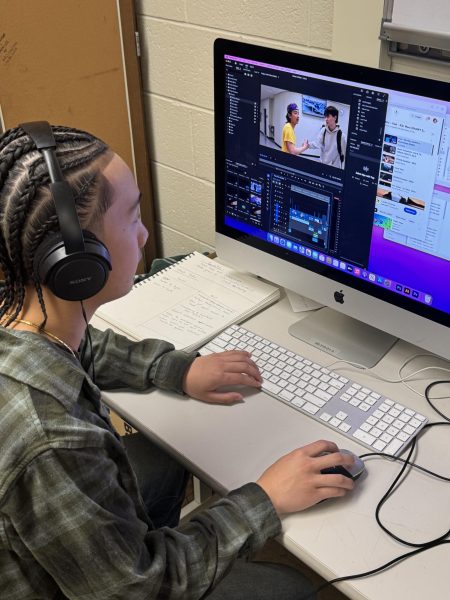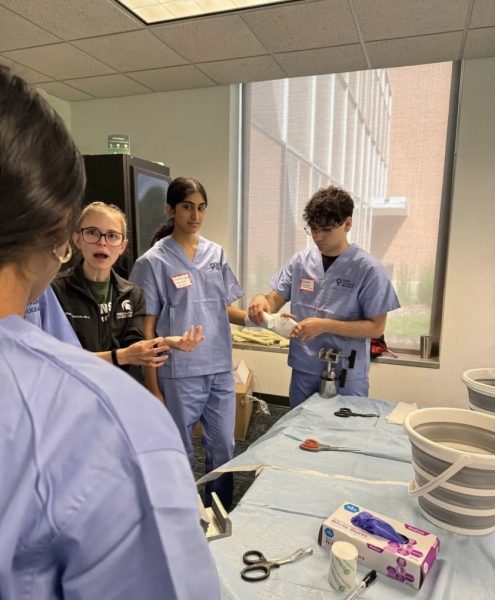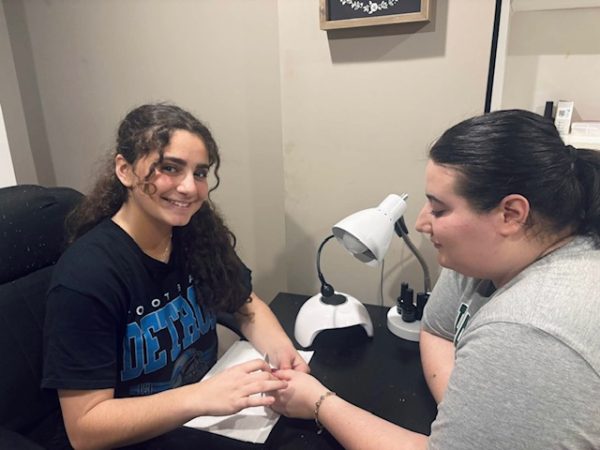The path to high school success
Spin the wheel, move 10 spaces, earn a college degree; the Game of Life is simple. The Game of College, however, not so much.
AP classes
Advanced placement (AP) classes are beneficial for applying to colleges said Tom Versle, counseling department head. And in 2015, 481 students took 851 AP tests.
“If a student takes and does well in AP classes, colleges feel comfortable that they will be prepared for classes at the next level,” Versele said.
While AP classes add additional course work, they add .5 to a GPA per AP class grade. Students can also challenge themselves with classes like Precalculus, physics or organic chemistry and colleges will still see the student can handle a challenge, Versele said.
Clubs and leadership
An outstanding GPA isn’t always enough anymore and students need to prove they can balance responsibilities.
“Everything matters when applying to a highly selective school,” said LeShane Saddler, associate director of admissions at Notre Dame.
Having extracurriculars isn’t enough to save someone with a low GPA, but someone with a high GPA can’t skip out on extracurriculars, according to Saddler. Colleges seek students who reach beyond and clubs and community service is a way to do that. Community service shows an admissions officer a student cares about more than themself.
SAT/ACT prep
It’s the test many students dread, but they can perform well if they allow themselves time to prepare.
“[The] ACT and SAT are similar to the Olympic Games,” said Marina Tsokur, tutor and owner of Brainy Kids Tutoring Center. “It is a show-time for a student. Olympic athletes spend four years to prep for [their] event. Prep for the ultimate game of your high-school years.”
The ACT and SAT often test skills students learn between sixth and eighth grade, according to Tsokur. The tests are fairly predictable, so preparation can significantly increase scores. Higher scores mean higher chances for students to gain admittance into their top choice school.
SAT subject test
The SAT subject tests are hour long tests with 20 multiple-choice questions.
“We don’t have a lot of students who take SAT subject tests. You’re talking about elite colleges— ivy leagues, places like Stanford or Northwestern,” Versele said.
Princeton Review recommends taking two or more SAT subject tests to showcase strengths, show interest in a major, fulfill college requirements or gain college credit. Test subjects range from math to foreign language to science. CollegeBoard recommends taking the SAT subject test directly following the student’s related course end.
College Research
With over 5,300 colleges and universities in the United States, it can be overwhelming for students to find information about them all; but with help from Naviance and other websites, it can be done.
“It’s called super college match and you go on there and you answer some questions and it’ll give you a list of colleges that meet the requirements you have,” said Dyann Pugliese career development facilitator. “The nice thing about it is it’ll show you what percentage it matches.”
This special tool can narrow a broad 5,300 colleges to choose from to those that fit a student’s needs and wants; it also includes trade schools and community colleges. Naviance provides students information about scholarships; it suggests local and national scholarships. There are books and websites, like the Princeton Review, which can aid in college research; although the best resource is a college’s actual website, Versele said.
Build bonds with teachers and counselors
College admissions officers read through thousands of letters of recommendations, so it’s important for students to bond with teachers or a counselor so they can write a stand out recommendation.
“For letters of recommendation, if you just had a teacher that you did pretty well [in their class,] but there was nothing that really stood out, they may just put ‘was a good student, did well in the class,’” Versele said. “But if you get to know them, they can point out specifics on things you did in the class that caught their eye.”
Letters of recommendation mean the difference for a student on the borderline of rejection or acceptance.
College visits
At the end of the day, students will spend the next four or five years of their lives at college and need to see it to experience it.
“You’d be amazed at the amount of students who will just apply [to Michigan State] because ‘Oh, I watch Michigan State sports’ or ‘all my friends are going to Michigan State, that’s why I want to go,’” Versele said. “At the end of the day, there’s a lot of other things [that matter.] Do they have your major? Does that campus fit your personality style?”
There are many factors to take into account during a visit, such as those listed on the college visit scorecard.
Apply early
Summer: the time to relax and not think about school. At all. However, that may not be the best idea for seniors.
“A person who applies at the end of August or early September, right when that application comes out, shows a college that they are A) a very motivated student or B) really want to attend their school. Either way, it works in your favor. I’ve had students who I wouldn’t have thought would get in get that acceptance letter, because they applied early.”
With an early application comes opportunities like early decision or early action. Early decision means the student receives an admission decision around December; and if accepted, would lose their deposit if they decided not to attend. Early action means students receive an admission decision around January or February and have until the regular deadline, May 1, to decide.
Find the perfect fit
Any student can find their postsecondary fit.
“You find it and you just feel it. It feels right,” Versele said.
Aspects like money and distance factor into deciding a college, but students should keep in mind they’ll be living there for four or five years, so they need to be comfortable.
If a student doesn’t think a four year university is their fit, there are 1,665 community colleges and many trade schools to consider as well.
“It’s not ‘everybody’s gotta go to college, everybody’s gotta go to college,” Versele said. “Everybody needs higher education.”
Your donation will support the student journalists of Eisenhower High School. Your contribution will allow us to purchase equipment and cover our annual website hosting costs.





